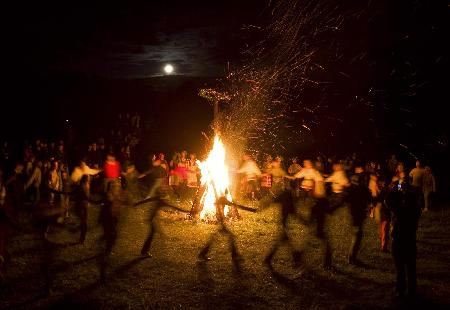David Heiller
The
search for lightning bugs started slowly with a lobbying effort by Michael, my
11-year-old nephew who spent a couple nights with us this week.
When I
got home from work at 6:30 Monday evening, he asked, “Do you think there’s many
lightning bugs out now, Uncle David?” He calls me “Uncle David” the way Huey,
Louie, and Dewey say “Uncle Donald,” and with the same glint in his eye.
“Sure,” I
said knowingly, falling back on my knowledge of the subject from the days when
I was Michael’s size.
“It sure will be fun catching them, won’t it?” he
continued.
“Yeah, it will,” I answered, not realizing that he had
just set the hook.
Like a good lobbyist, Michael dropped the subject. After
supper, we went for a walk down the road, found a few agates, threw rocks at
telephone poles. Michael found a striped green catepillar, and informed us that it would soon turn into a monarch butterfly. He broke a leaf off, and put it in a screened box that my bees come in.
“I like to fill that box up with lightning bugs and use it for a lamp to save electricity,” I told Mike. He looked at me like he believed it.
“I like to fill that box up with lightning bugs and use it for a lamp to save electricity,” I told Mike. He looked at me like he believed it.
After the
walk, Michael, Noah, and I went into the field behind the house to explore some
more We checked out the blue bird houses, and found two boxes occupied. In one,
the young bluebirds had a streak of bright blue across their wing feathers.
Michael peered in, and reached to touch one, but I stopped him. I had to lift
Noah up to see them.
We walked
toward the woods, moving ahead of Noah in the tall grass. I whispered to Mike, “Let’s
hide.” He smiled, and we inched faster ahead, then ducked down behind some
brush.
“Dad,
where are you?” Noah called. His voice told me he knew this was a game. “Don’t
talk,” Michael whispered.
 |
| Noah and Uncle Danny. |
Noah repeated that he was leaving. We waited. He waited.
Finally, he gave his Loon Call, which sounds more like a kid falling off the
Swiss Alps. I couldn’t resist. I answered with my Loon Call, which sounds more
like my wife laughing when she talks on the telephone. We all stood up, and our
walk continued.
“When
will the lightning bugs be out?” Michael started asking, as we checked out the
deer stand. He repeated the question as we peeked into the last of the blue
bird houses, and back at the house as they put on their pajamas.
“Go to your room and look out the window. When you see the
lightning bugs, you can come down,” I finally told them at 9:30. Noah is
usually in bed by 7:30.
Soon they came pounding down the stairs, roaring past me
as I sat at my computer at the kitchen table, trying to think of a column for this week. “Aren’t you
coming?” Michael asked as the screen door slammed.
Well, it had been a while. So I had grabbed an empty mayonnaise
jar and followed them out
Michael already had something glowing in his hand. “It
flew up and landed on my face by the clothes line,” he said. “Look at it.” He
showed me the blinking bug, then put it in the jar.
The search continued. But it was not a good lightning bug
night. Their day had come two weeks earlier, and now only a few old lunkers
flew high above, or far off in the field. We circled the house twice, but one
bug was it.
“Time to come in,” I said, and said again. Michael put the
jar on the porch. “Wait, if you leave the jar here, they’ll see it and come in,”
he said. Noah looked at his cousin in rapture. Made sense to him, like it had
made sense to me when Danny used to say that there were tiny bulldozers in
water so we didn’t have to use soap when we took baths together on Saturday
night. Same principle, 30 years later.
I finally got them inside, and poked some holes in the lid
of the jar, and they went upstairs to examine their lonely firefly. Ten minutes
later they were asleep.
It’s been a long time since I’ve gone on a firefly hunt.
Too long? I guess a little late night lobbying never hurt anyone.




